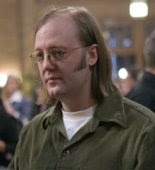
Are Americans too conservative to appreciate innovative cooking?
If so, the line waiting to see avant-garde chefs Jose Andres and Wylie Dufresne was no indication. It spilled out the back of the National Museum of Natural History and spanned forty people.
I joined the tail and scanned the crowd. The Embassy of Spain was sponsoring the event, so were these people Spanish nationalists or food celebrity stalkers like me? Their bellies didn’t seem big enough to be foodies. On the other hand, they enthusiastically spread rumors that the event would include a cooking demonstration and tastings.
As I was ushered into a crowded auditorium, the evening’s main attractions brushed past me on their way to the stage. Wylie looked about as pretentious as a school bus driver, with long, flat hair and outfit by Eddie Bauer. Stocky Jose wore a bright red scarf and spoke loud Spanish into his cell phone.
The two chefs were there to talk about vanguard cuisine. Depending on who you speak to, the vanguard movement is either the art of creatively challenging the culinary status quo, or, in the words of Jeremy Bentham, “merely nonsense upon stilts.” Jose is a native of Spain and is credited with introducing Americans to both avant-garde Spanish food and traditional tapas. Wylie’s WD-50 specializes in avant-garde cuisine and ranks fourth on New York Magazine’s list of the City’s best restaurants.
The lights dimmed, and the crowd rolled their eyes when the President of the Embassy mispronounced Wylie’s name “Dufrez” during the introduction. But the dialogue that followed was fascinating. Here are some highlights:
The Ghost of Salvador Dali
Both chefs, and moderator Coleman Andrews of Saveur Magazine, talked passionately about recent food innovations in Spain, but they admitted that the food there hasn’t always been so dynamic. Andrews recalled that in the early 1980s he set out to write a book about Spanish cuisine. After spending a year working his way from Barcelona to Sevilla and finding nothing but paellas and French food, he wrote a travel guide about the Riviera instead.
But in 1984, at the age of 22, a skinny kid named Ferran Adria got his start as line cook at El Bulli in northern Spain. 18 months later, he was head chef, and soon his innovations were rapidly replacing the three hundred year-old paella recipes, not to mention le diner.
The lights dimmed, and the crowd rolled their eyes when the President of the Embassy mispronounced Wylie’s name “Dufrez” during the introduction. But the dialogue that followed was fascinating. Here are some highlights:
The Ghost of Salvador Dali
Both chefs, and moderator Coleman Andrews of Saveur Magazine, talked passionately about recent food innovations in Spain, but they admitted that the food there hasn’t always been so dynamic. Andrews recalled that in the early 1980s he set out to write a book about Spanish cuisine. After spending a year working his way from Barcelona to Sevilla and finding nothing but paellas and French food, he wrote a travel guide about the Riviera instead.
But in 1984, at the age of 22, a skinny kid named Ferran Adria got his start as line cook at El Bulli in northern Spain. 18 months later, he was head chef, and soon his innovations were rapidly replacing the three hundred year-old paella recipes, not to mention le diner.

Pictured above, Adria started a style of cooking based on the imagination, studying all the creative possibilities of traditional ingredients and playing with form and mouthfeel. Each year, he closes El Bulli and devotes six months to laboratory research in Barcelona to come up with new ideas. As the eccentric pioneer of the vanguard movement, he's has been called many things: genius of El Bulli, mad culinary scientist, and on stage, Jose inexplicably referred to him as the Devil.
Despite suggesting that Adria was pure evil, Jose also gushed about him. He noted that the legendary chef was born in the same Catalonian village as Salvador Dali, and Catalonians believe that artist was reincarnated as Adria.
Throwing Out the Blueprint
Adria’s approach took root all over Spain and in the United States, and although Jose was too proud to say it, he implied that his innovative and playful style was inspired by Adria.
Wylie was a little more forthright about having used both Adria and Jose as models. Only months after Wylie arrived in Manhattan, Jose took an interest in him and arranged a series of trips for his sloppy-looking American protégé to study vanguard cuisine in Spain. During one of these trips, Wylie picked up a recipe book in Catalan with photographs of food so beautiful that to this day he still flips through the book for inspiration, even though he can’t read a word.
“Don’t worry,” said Jose in his thick Spanish accent, “the same thing happens to me with English books.”

But Jose’s influence on Wylie extended beyond a few TripTiks. “For me and many others, Jose legitimized throwing out the blueprint,” Wylie explained. “It’s not that I’m copying Jose. It’s that I’m willing to throw out the blueprint because Jose had the courage to do so first.”
For the second half of this blog, go to Interview with Jose Andres and Wylie Dufresne, Part 2.

What the what?! I didn't even get to improve the blog yet...
ReplyDelete